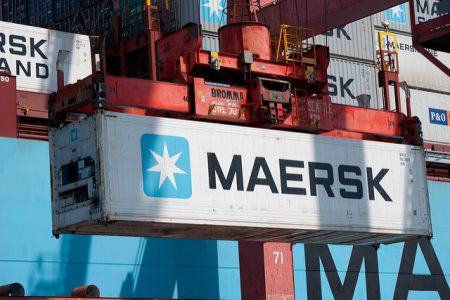The companies have announced plans to launch a new distributed ledger platform that is expected to change and improve the global logistics industry.
Denmark-based transport and logistics company, Maersk, has partnered with IBM to develop a new blockchain-based platform to manage cross-border transactions in the shipping supply chain.
Built on the Linux Foundation’s open source Hyperledger platform, the new solution will help to digitize the supply chain process, which involves much paper work today. The platform is expected to enhance transparency and secure data sharing among partners.
Maersk and IBM will work with freight forwarders, shippers, ports, ocean carriers, and customs authorities while creating a system. The production is set to start later this year.
“As a global integrator of container logistics with the ambition to digitize global trade, we are excited about this cooperation and its potential to bring substantial efficiency and productivity gains to global supply chains, while decreasing fraud and increasing security,” Ibrahim Gokcen, chief digital officer at Maersk, said in a press-release.
“We expect the solutions we are working on will not only reduce the cost of goods for consumers, but also make global trade more accessible to a much larger number of players from both emerging and developed countries.”
The blockchain technology has the potential to reduce errors and waste, minimize the risk of fraud, enhance inventory management, save time and money.
“We believe that this new supply chain solution will be a transformative technology with the potential to completely disrupt and change the way global trade is done,” said Bridget van Kralingen, senior vice president, Industry Platforms, IBM.
“Bringing together our collective expertise, we created a new model the industry will be able to use to help improve the transparency and efficiency of delivering goods around the globe.”
According to Maersk, a delivery of refrigerated goods from East Africa to Europe goes through around 30 people and organizations, with over 200 different interactions and communications being conducted among them.
To show the potential of the distributed ledger solution, the companies have carried out a few supply chain tests with Maersk Line container vessels, Port of Newark, the Port of Rotterdam, and Customs Administration of the Netherlands. The U.S. Department of Homeland Security Science and Technology Directorate, and U.S. Customs and Border Protection also took part in the pilot conducted as part of a EU research project.
The first trial occurred last summer using shipments of flowers from Kenya to Royal FloraHolland in the Netherlands. After successfully completing the test, IBM and Maersk continued by transporting containers with pineapples from Colombia, and mandarin oranges from California into the Port of Rotterdam.
next